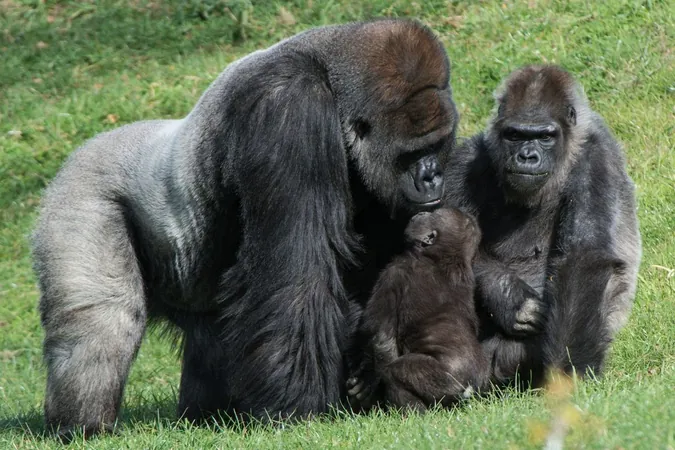
Unveiling the Power Dynamics: Female Gorillas Can Dominate Males Twice Their Size
2025-08-07
Author: Jia
Breakthrough Study Challenges Gorilla Gender Norms
A groundbreaking study has revealed that despite being significantly smaller, female gorillas often overpower their male counterparts in battles for status and resources. This shocking discovery turns traditional views of gorilla society upside down, suggesting a more balanced gender dynamic than previously believed.
Research Findings from Leading Institutions
Conducted by esteemed researchers from the Max Planck Institute for Evolutionary Anthropology in Germany and the University of Turku in Finland, the study spanned over 25 years, meticulously observing gorilla behavior within four different social groups.
Beyond Patriarchy: Gorilla Hierarchies Examined
Historically, wild mountain gorillas were thought to have a strict male-dominated hierarchy due to their vast size differences. While gorilla society does have an alpha male at the top, the new research indicates that female gorillas frequently outrank their male peers, challenging long-held beliefs.
Female Gorillas Lead the Charge
Lead author Dr. Nikos Smit explained, "Gorilla females often outrank males. This finding shifts our understanding of power dynamics; it’s not solely about size or strength." In fact, a striking 88% of female gorillas managed to outrank at least one adult male in social groups, especially younger or older males.
Astounding Conflict Outcomes: Size Doesn't Always Win
When it comes to confrontations with non-alpha males, female gorillas secured victories more than 25% of the time. These victories highlight the significance of social insights rather than mere physical prowess.
Social Dynamics Play a Crucial Role
Dr. Martha Robbins, a senior author of the study, noted that non-alpha males realize the importance of social hierarchy. They often avoid aggression towards females, recognizing the protective nature of the alpha male.
The Real Prize: Access to Food
Interestingly, the competition often centers around food rather than mates, revealing that both genders actively vie for resources. This challenges previous assumptions that females only contend with one another for sustenance.
Implications for Understanding Human Societies
The researchers assert that the insights gleaned from gorilla hierarchies could reshape our perspective on gender dynamics in human societies. They argue that the notion of male dominance as an evolutionary consequence may be misguided, indicating that flexible social systems are key.
Looking to Our Primate Relatives
Further supporting their conclusions, scientists pointed out that among bonobos—our close relatives—females dominate despite the size advantage of males. This suggests that patriarchy is not an inherited trait from our primate ancestors.
A Transformative Discovery for Gender Dynamics
With this revolutionary understanding of gorilla society, the study invites us to reconsider our own social structures. Could insights drawn from our closest primate relatives hold the key to rethinking gender roles in modern human interactions?




 Brasil (PT)
Brasil (PT)
 Canada (EN)
Canada (EN)
 Chile (ES)
Chile (ES)
 Česko (CS)
Česko (CS)
 대한민국 (KO)
대한민국 (KO)
 España (ES)
España (ES)
 France (FR)
France (FR)
 Hong Kong (EN)
Hong Kong (EN)
 Italia (IT)
Italia (IT)
 日本 (JA)
日本 (JA)
 Magyarország (HU)
Magyarország (HU)
 Norge (NO)
Norge (NO)
 Polska (PL)
Polska (PL)
 Schweiz (DE)
Schweiz (DE)
 Singapore (EN)
Singapore (EN)
 Sverige (SV)
Sverige (SV)
 Suomi (FI)
Suomi (FI)
 Türkiye (TR)
Türkiye (TR)
 الإمارات العربية المتحدة (AR)
الإمارات العربية المتحدة (AR)